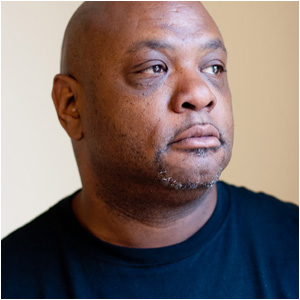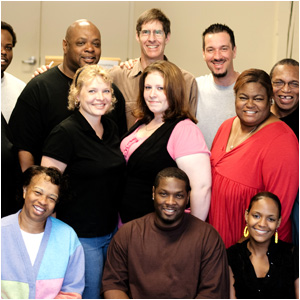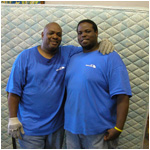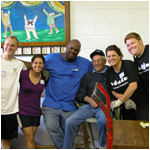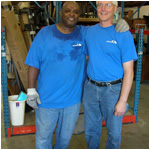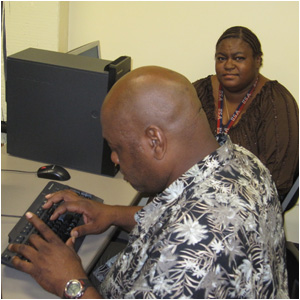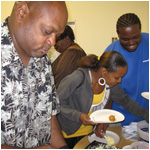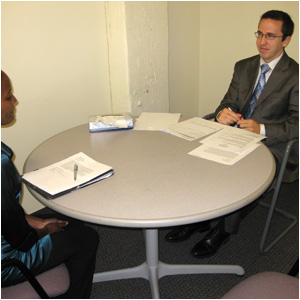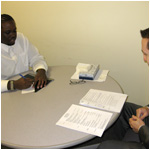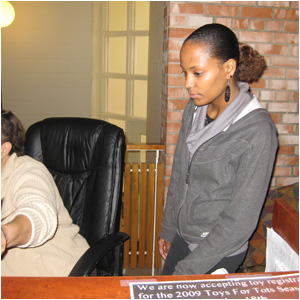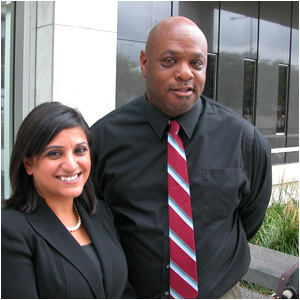Leaving the Poverty Trap
It's a warm July evening in a lively Minneapolis neighborhood. Kids in tank tops and flip flops scamper from one front yard to another. Samantha McNeal is on the porch of her lower duplex apartment, feeding bites of takeout pizza to her 9-month-old daughter and watching her other kids play.
The slight woman with doe eyes has packed a lot into 26 years. Her oldest daughter, S'mya, was born while Samantha was a 12th grader in Chicago.
"I finished high school," Sam says proudly. "My daughter was 2 months at the time and I kept going, still graduated with my class, went to prom and everything."
But after graduation, Sam couldn't find a job in Chicago that led anywhere. She worked at McDonald's, did hair for cash. She was living hand-to-mouth.
She and her mother moved to Minneapolis in late 2008 to escape her mom's abusive husband. Sam's mother had survived cancer and kicked long-term drug addiction. They lived in a homeless shelter for four months while they scraped together the money to rent an apartment. Sam's mother got on disability, but Sam still wasn't able to find steady work. A friend said a non-profit group called Twin Cities RISE! (TCR) could help her get on her feet.
TCR is an anti-poverty program that tries to find good jobs for people who wouldn't otherwise get them. Many clients have the problems that often accompany multi-generational poverty: homelessness, chemical dependency, criminal records. TCR teaches them the basics like writing, math and computer literacy. But its most important lessons are "soft skills" - skills such as self-control and time management.
Sam says she grew up without learning those skills. Because of her mother's drug use, Sam never had much of a home. She had a short fuse and a short attention span. She had a reputation for being late. She says she never considered the consequences of her actions.
"I was young and dumb and not really thinking," she says. "Having sex with a lot of different guys was the main thing." Now she has four children by four different men.
She dreams of supporting her children with "a good job that I actually like."
That's a goal TCR wants to help Sam achieve. It places clients in positions that pay at least $20,000 a year, jobs with benefits and advancement opportunities. TCR says that's the threshold families need to escape the trap of multigenerational poverty.
Samantha starts the program in March. The entering class of 91 people meets four half-days a week for eight weeks. That's session one. There are five sessions a year.
In session one, there's a lot of role-playing and sharing anecdotes from troubled pasts. The students imagine themselves in control of their decisions. They learn to take responsibility for everything they do, and where to get help if they have specific problems.
Then they break into smaller groups for classes in writing, math, computer literacy and speech. All the classes try to incorporate workplace and life skills.
Samantha always sits in the back row of the classroom next to a big guy named Russell Brockman. She's shy; he's not. There's another guy - Ephraim "Biggie" Williams - who always sits in the front row. They become the nucleus of a lively circle of friends who spend days off together, organize potluck meals and provide each other lots of moral support.
One day in speech class, when it's Biggie's turn at the podium, he haltingly delivers the standard greeting.
"Good morning, fellow speechcrafters and honored guests," he begins. His job is to introduce the first speaker.
"Growing up in Chicago, Russell's life was centered around football," Biggie reads from a piece of paper. "His lifelong dream was to play for the Dallas Cowboys. Please give a warm welcome to Russell Brockman."
The class applauds while Russell rises to take his turn up front. He's had to compose not just a speech, but also the introduction Biggie just read. He did it in the computer lab across the hall. Before TCR, Russell had never used a computer.
"Just to send an introduction involves sending an email, composing a Word document, meeting a deadline, and using good email etiquette," says teacher John Landretti. He describes the speech class as "public speaking plus soft skills and workplace skills all combined into one class."
Russell's speech is about why he loves playing dominoes. By now, most of his classmates know a lot more about Russell, too.
Russell Brockman is 44. He's spent almost half his adult life in prison.
"I came up as a gang banger," he says. As a child in a rough Chicago neighborhood, he was surrounded by crime and violence.
Russell says his only choice was to get beat up or do the beating. So he joined the Black Disciples, a legendary Chicago street gang.
He says he started out stealing cars, and then it escalated. "Armed robbery, attempted murder, not anything more worse than that," he says. "But it led to some pretty graphic things…I took advantage of any and everybody I could, you know. Make money. Do things I wanted to do. I was just evil, you know."
In 2005 Russell moved to Minnesota to live with a sister. He thought he'd try to reform. But he couldn't find a job, and he went back to dealing drugs and stealing cars. He got caught, served a year in jail, and tried again to find his way out of trouble. He was waiting for a bus at a mall on the edge of town, "trying not to steal nothing," when a salesman at a cell phone store approached him.
"I ain't got no cell phone, no job, and no money," Russell says he told the salesman. "Now unless you agree to give me a cell phone, and I ain't got to pay nothing, we ain't got nothing else to talk about."
The salesman asked why Russell was unemployed.
"Because I'm an ex-con and and they ain't hiring felons!"
Russell says he was starting to get angry. Then the salesman said he was an ex-con too, with six felony convictions to Russell's 11. He told Russell that TCR helped him get his job, and he urged Russell to contact the organization.
When TCR accepted him, Russell says he was surprised and thrilled. "I've been loving it ever since," he says. "It's been a beautiful experience. One of the best experiences of my life."
TCR has convinced the state of Minnesota that it's smart to invest in people like Russell and Sam. A little up front saves a lot in public assistance or incarceration down the road. So the state legislature gives TCR $9,000 for each client who is gainfully employed for one year. That amounts to about 5 percent of the budget. TCR says the success of its clients is saving the state $1 million a year.
"We have to work at building people's esteem," says Peggy Yusten, Chief Operating Officer at TCR. "And we do it by setting pretty high standards here."
There's a strict attendance policy and a dress code. Yusten says she tells clients if they can succeed at TCR, they will succeed in the work place.
"They teach you to be a better person and how to deal with people and control your feelings," Russell says. "Regulate your temper so that you don't go off on nobody."
When TCR determines students have the confidence and the skills to work, they are offered an internship with an employer. TCR is well-connected in the corporate world, and used to be able to place its students in jobs through its influential board members. But the recession has made even those entry-level jobs elusive.
TCR has had to figure out how to compensate for the job shortage. "So we put in place a program that provides internships for participants so they can earn some money while they're in the program," Yusten explains.
An internship doesn't pay as much as a real job, but Yusten says the hope is that it'll be enough to keep clients coming to TCR. "We have to retain them so we can get them to the skill level so they can get a decent job," she says. TCR pays interns $150 a week.
Russell started his internship at the beginning of the summer. He works four afternoons a week in a non-profit warehouse called Bridging Inc. that gives free furniture to poor people setting up new households.
Russell is a big man, over 6 feet and 300 pounds. At work he's in constant motion, heaving furniture into a waiting semi, wheeling the dolly down the aisle for another load. His blue "Bridging" T-shirt is soaked with sweat and his bald head is shiny, but he's almost always smiling and joking around. He's a favorite of the staff, including Bridging's founder, Fran Heitzman.
"He's worked so hard and he's such a gentleman," Heitzman says. "I wish we had a job opening for him; I'd hire him tomorrow morning."
The affection is mutual. Russell says he loves his job. "You ain't looking over your shoulder for people who want to rob you," he says. "It's a beautiful life, living legally."
He says he's ready to give up thousand dollar paydays selling drugs in favor of "a decent-paying job, maybe $12 or $13 an hour." He knows his felony record will keep him from working at a lot of places, but he's optimistic that TCR can help.
"It takes time to transform people's lives," Yusten says, typically at least two years. TCR doesn't "graduate" its clients until they've held a good fulltime job - with benefits - for a full year. They're employed at more than 200 local businesses, from big companies like General Mills and Target to small non-profit community groups.
"[The people from] TCR will stick with you," Yusten tells prospective employers. "They will be there once the economy changes. They will grow with your company. Plus they really want that job, they're not just taking that because it's all that's available."
Yusten could be describing Antoine Perkins. He works for AT&T's collections department in their gleaming headquarters just off the freeway south of town. He makes $27,000 a year "plus bonuses, three raises a year and full benefits including tuition reimbursement," he says.
Like Samantha, Antoine grew up on welfare in Chicago. He finished high school, but left college in the first semester because he couldn't pay tuition.
After that he worked a series of short-term, hourly jobs, got into debt, lived with a girlfriend and fathered a son. He moved to Minneapolis when that relationship ended.
"I didn't have an outline as to what the future would be," he says. He credits TCR with teaching him how to organize his life, take care of his son, and plan for the future.
Now he has a retirement plan and health insurance for his toddler. He pays child support. "Now I want a degree in business administration," he says. "I can use that and my work experience to move up in the company."
In 2008, TCR graduates earned an average of about $25,000, not including benefits. TCR says that over its 12-year history, 73 percent of graduates have remained gainfully employed. Not only do many graduates go from public assistance to taxpayer, they help stabilize their families and their neighborhoods, so that the change transforms more than one person.
On Wed. August 5, after Russell and Samantha have been in the program six months, someone robs First National Bank of The Lakes in downtown Minneapolis. The robber leaves a fingerprint and the incident is caught on videotape. It's Russell.
He's arrested the next day, Thursday.
Friday night his friends from TCR gather at Samantha's house, as usual. They've seen Russell's picture in the newspaper. They are distraught, disappointed.
"I'm kind of heartbroken," Samantha says. She says she would have given Russell money if she'd known he needed it.
Biggie Williams - who interned at the warehouse with Russell - is puzzled because Wednesday is pay day. "He had money in his hand," Biggie says. "Why would he need to do this? For what?"
In court Russell admits that he fell off the wagon after nearly three years of sobriety. He used his paycheck to hire a prostitute. They drank alcohol and smoked crack, and then he wanted more.
"I feel like an idiot," Russell says in an interview a few weeks later.
"What hurt most is giving up all the time I had clean and sober," he says. "I never in my life dreamed of robbing a bank."
Russell stays in a halfway house while he awaits sentencing. If the court determines that Russell is a "career" criminal, he could go to prison for more than 20 years. He and his lawyer expect he'll do at least five.
Peggy Yusten says Twin Cities TCR will work with him if he wants to try again when he's released.
"Him not being here is a little downing, but both of us came here wanting to better ourselves," Biggie says. "I wouldn't be doing myself or him any justice if I didn't continue to do that."
In the fall Biggie gets a regular hourly job working afternoons at Bridging. He can't afford an apartment yet, but he makes more money than he did as an intern. He works as many hours as he can. He likes to build things, and is looking for a more challenging job. He wants to own his own machine shop some day.
He and Sam still take classes at TCR in the morning. They are working with job coaches now, doing practice interviews and polishing their resumes.
During a mock interview, a volunteer from a corporate personnel department asks Sam what her greatest strength is. "Now, it's time management," she says. In October she wins a $50 gift certificate for having perfect attendance. She says she's come a long way from the days when she couldn't get up in the morning and couldn't get to appointments on time.
In November she starts an internship working for the pastor of a church in her neighborhood.
In December she has an appointment to get her tubes tied. She has a boyfriend and she doesn't want any more children.
Peggy Yusten says that if TCR can help the parents get out of poverty, the children will follow. That's the whole idea. TCR wants to break the cycle of multigenerational poverty and replace it with one of education and employment.
Editor's note: The founder and chair of Twin Cities RISE! is businessman Steven Rothschild. He is also on the board of trustees for American Public Media.
Back to Workplace U.


